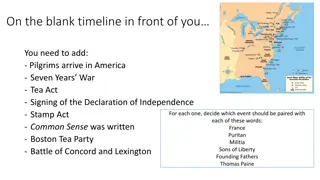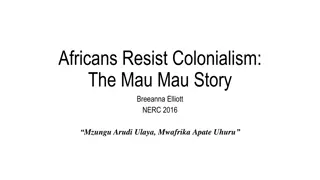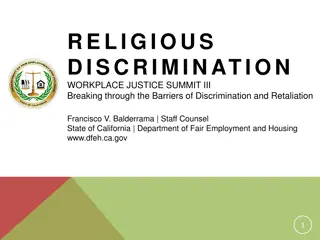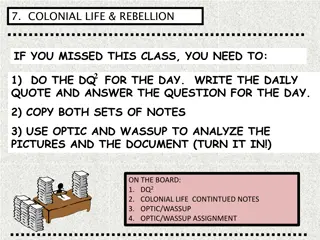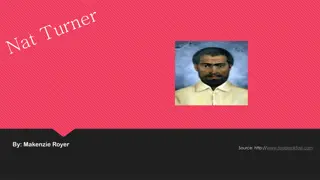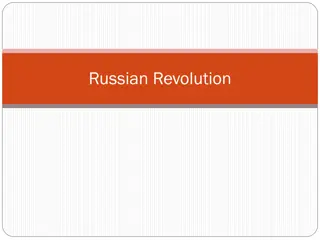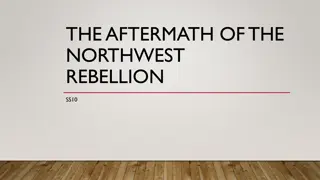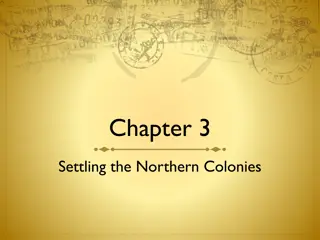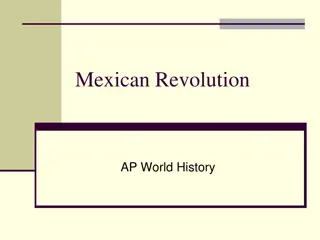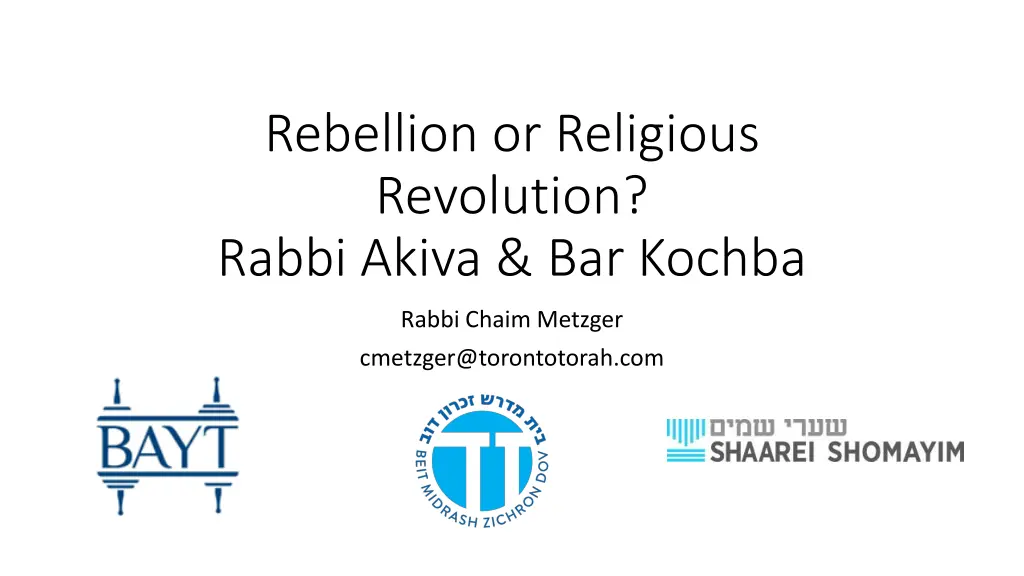
Rebellion or Religious Revolution? Rabbi Akiva & Bar Kochba
Explore the historical context and significance of Rabbi Akiva's support for Bar Kochba's army, the failed rebellion, and the legacy of these events in Jewish history. Learn about Bar Kochba's leadership in the revolt against Rome and the discovery of his letters in the Judean Desert.
Download Presentation

Please find below an Image/Link to download the presentation.
The content on the website is provided AS IS for your information and personal use only. It may not be sold, licensed, or shared on other websites without obtaining consent from the author. If you encounter any issues during the download, it is possible that the publisher has removed the file from their server.
You are allowed to download the files provided on this website for personal or commercial use, subject to the condition that they are used lawfully. All files are the property of their respective owners.
The content on the website is provided AS IS for your information and personal use only. It may not be sold, licensed, or shared on other websites without obtaining consent from the author.
E N D
Presentation Transcript
Rebellion or Religious Revolution? Rabbi Akiva & Bar Kochba Rabbi Chaim Metzger cmetzger@torontotorah.com
Rabbi Akiva & Bar Kochba Who was Bar Kochba? Why did Rabbi Akiva support Bar Kochba and his army? Did Rabbi Akiva s students die as part of the failed rebellion? What happened to Rabbi Akiva after the rebellion?
Why is he called Bar Kochba? ' ) . . ( ' ' " Rabbi Shimon Bar Yochai said: My teacher, Rabbi Akiva, would expound on the verse "A Star has risen from Jacob (Bamidbar Rabbi Akiva would see Bar Kuzba (Bar Kochba) he would say, 'that is the King the Messiah. Rabbi Yochanan ben Torta said to him: Akiva! Grass will grow on your cheeks and the (Mashiach) will still not have come! . (Talmud Yerushalmi Taanit 4:5) : ' 24:17) When . son of David
Who was Bar Kochba? Leader of a revolt against Rome 132- 135 CE In response to Emperor Hadrian trying to construct Aelia Capitolina over a destroyed Jerusalem and a temple of Jupiter on Temple Mount
Bar Kochbas Letters Found by Professor Yigael Yadin in 1960-1961 in the Judean Desert Full name Shimon son of Kosibah
Letter of the 4 Species [3] Shimeon to Yehudah bar Menashe in Qiryath 'Arabaya. I have sent to you two donkeys, and you must send with them two men to Yehonathan, son of Be'ayan and to Masabala, in order that they shall pack and send to the camp, towards you, palm branches and citrons. And you, from your others who will myrtles and willows. See that they are tithed and sent them to the camp. The request is made because the army is big. Be well. Translation Yigael Yadin 1971 . ) ??? . place, send bring you
Rabbi Akivas Reputation " . " The Gemara illustrates this idea through a relevant story. An incident occurred involving several students of Rabbi Akiva who were traveling to Keziv. Along the way, bandits encountered them and said to them: Where are you going? Rabbi Akiva s students said to them: To Akko. Once they reached Keziv, Rabbi Akiva s students separated from the bandits. At this point the bandits said to them: Whose students are you? The students said to the bandits: We are students of Rabbi Akiva. The bandits said to them: Fortunate are Rabbi Akiva and his students, as they were never harmed by an evil person. Avodah Zarah 25b (William Davidson Translation) '? ' "
Aftermath of Rebellion (Yerushalmi Taanit 4:5) " " . ( . Rabbi Yochanan said Hadrian Caesar killed 800,000people in Beitar. R Yochanan said 80,000 pairs of Horn Blowers (heads of troops) laid siege to Beitar (stronghold of revolt). Bar Kozba was there with 200,000 troops that had fingers missing (bitten off in test of bravery). The Sages asked him, Until when will you make Israel maimed ? He replied hwo else should I test their loyalty? They said have them go out on horseback and see who can uproot a cedar astride and he gathered 200,000 more men. Before they went to battle they would say Master of the Uniiverse, Don t support, nor embarrass us But You have rejected us, O God; God, You do not march with our armies. (Tehillim 60:12) . ) :
Fall of Beitar . For three and a half years Hadrian surrounded Bethar and Rabbi Eleazar Ha-Modai sat on sackcloth and ashes and prayed every day, and said, "Master of the Universe, Do not sit in judgement today, do not sit in judgement today." ' Hadrian was ready to leave the city (i.e. to give up the siege). A Samaritan said to him, "Do not go because I see that the city is prepared to surrender to you." He entered the gate of the city. He went up and found Eleazar Ha-Modai standing and praying. He whispered in his ear. The people of the city saw and went to Kozba. They said to him, "We saw this old one (the Samaritan) talking to your uncle, (Eleazar)." He (Bar Kokhba) said to him (the Samaritan), "What did you say to each other?" "If I would tell you, the king would kill me. And if I do not tell you, you will kill me. Better that the king should kill me and not you." He said, "He said to me, will surrender the city.' " He (Bar Kosiba) went to R. Eleazar and said, "What did this Samaritan say to you?" He said, "Nothing." "What did you say to him?" "Nothing." He (Bar Kosiba) kicked him and killed him. Immediately a Bat Kol [Heavenly Voice] came out and said, " 'Woe to the worthless shepherd who leaves his flock. Destruction to his arm and his right eye. His arm will dry up and his right eye will become opaque' (Zach. 11,17). You have killed R. Eleazar Ha-Modai, the arm of all Israel and her right eye. Therefore shall the arm of this man be withered and his right eye utterly blinded." Immediately Bethar was conquered and Ben Kozba was killed. They went and carried his head to Hadrian. He said to them, "Who killed this man?" A Samaritan said to him, "I killed him." "Show me the corpse." He showed him the corpse and found a snake wound around it. He said, "If God did not kill him, who could have killed him?" And he said about him, " 'Unless their rock had sold them and their Lord had given them up' " (Deut. 32,30). . . . " . Translation Adele Reinhartz
Alternative End (Sanhedrin 93b) ' ,' ' ' . , The Messiah as it is written (Isa. 11,2): "And the Spirit of the Lord shall rest upon him, the spirit of wisdom and understanding, the spirit of counsel and might, the spirit of knowledge and the fear of the Lord. And shall make him of quick understanding [wahariho] in the fear of the Lord." R. Alexandri said, "This teaches that he loaded him with good deeds and suffering as a mill \rehayyim\ [is laden]." Raba said, "He smells [a man] and judges, as it is written. 'And he shall not judge after the sight of his eyes, neither reprove after the hearing of his ears, yet with righteousness shall he judge the poor' " (Ibid.). Bar Kosiba reigned two and a half years and then said to the Rabbis, "I am the Messiah." They answered, "Of the Messiah it is written, 'He smells and judges.' Let us see whether he can do so." When they saw that he was unable to judge by the scent, they slew him (Soncino Talmud Translation) - . , - : : . , : : . .
Could he have been Mashiach? [ . ] . It should not occur to you that the King Messiah must bring wondrous signs or perform marvels or invent new things or revive the dead or anything like what the fools say. It is not so. For Rabbi Akiva, one of the wisest of the Sages of the Mishna, was King Ben Coziba s124Bar Cochba. arms- bearer125I.e. his staunch supporter. and said that he was the King Messiah. He and all the Sages of his generation thought that he was the King Messiah, until he was killed because of his sins126He killed Rabbi Elazar HaModai.. Since he was killed, they then understood that he was not the one. The Sages never asked of him neither a sign nor a wonder. Rambam: Kings 11: 3 Translation from Sefaria . . . . . .
Cassius Dio (164-235 CE) on Bar Kochba Then, indeed, Hadrian sent against them his best generals. First of these was Julius Severus, who was dispatched from Britain, where he was governor, against the Jews. [69.12.1] At Jerusalem, Hadrian founded a city in place of the one which had been razed to the ground, naming it Aelia Capitolina, and on the site of the temple of the [Jewish] god, he raised a new temple to Jupiter. This brought on a war of no slight importance nor of brief duration, [69.13.3] Severus did not venture to attack his opponents in the open at any one point, in view of their numbers and their desperation, but by intercepting small groups, thanks to the number of his soldiers and his under-officers. By depriving them of food and shutting them up, he was able - rather slowly, to be sure, but with comparatively little danger - to crush, exhaust and exterminate them. Very few of them in fact survived. [69.12.2] for the Jews deemed it intolerable that foreign races should be settled in their city and foreign religious rites planted there. So long, indeed, as Hadrian was close by in Egypt and again in Syria, they remained quiet, save in so far as they purposedly made of poor quality such weapons as they were called upon to furnish, in order that the Romans might reject them and they themselves might thus have the use of them. But when Hadrian went farther away, they openly revolted. [69.14.1] Fifty of their most important outposts and nine hundred and eighty-five of their most famous villages were razed to the ground. Five hundred and eighty thousand men were slain in the various raids and battles, and the number of those that perished by famine, disease and fire was past finding out. [69.12.3] To be sure, they did not dare try conclusions with the Romans in the open field, but they occupied the advantageous positions in the country and strengthened them with mines and walls, in order that they might have places of refuge whenever they should be hard pressed, and might meet together unobserved under ground; and they pierced these subterranean passages from above at intervals to let in air and light. [69.14.2] Thus nearly the whole of Judaea was made desolate, a result of which the people had had forewarning before the war. For the tomb of Solomon, which the Jews regard as an object of veneration, fell to pieces of itself and collapsed, and many wolves and hyenas rushed howling into their cities. [69.13.1] At first, the Romans took no account of them. Soon, however, all Judaea had been stirred up, and the Jews everywhere were showing signs of disturbance, were gathering toghether, and giving evidence of great hostility to the Romans, partly by secret and partly by overt acts. [69.14.3] Many Romans, moreover, perished in this war. Therefore Hadrian, in writing to the Senate, did not employ the opening phrase commonly affected by the emperors, "If you and your children are in health, it is well; I and the legions are in health." [69.13.2] Many outside nations, too, were joining them through eagerness for gain, and the whole earth, one might almost say, was being stirred up over the matter.
Why he wasnt the Messiah He died His sins with Rabbi Elazar HaModai Those who followed him not fully believing in G-d
Rabbi Akivas Arrest and Death (Brachot 61b) The Sages said: Not a few days passed until they seized Rabbi Akiva and incarcerated him in prison, and seized Pappos ben Yehuda and incarcerated him alongside him. Rabbi Akiva said to him: Pappos, who brought you here? Pappos replied: Happy are you, Rabbi Akiva, for you were arrested on the charge of engaging in Torah study. Woe unto Pappos who was seized on the charge of engaging in idle matters. The Gemara relates at length how Rabbi Akiva fulfilled these directives. The Sages taught: One time, after the bar Kokheva rebellion, the evil empire of Rome decreed that Israel may not engage in the study and practice of Torah. Pappos ben Yehuda came and found Rabbi Akiva, who was convening assemblies in public and engaging in Torah study. Pappos said to him: Akiva, are you not afraid of the empire? The Gemara relates: When they took Rabbi Akiva out to be executed, it was time for the recitation of Shema. And they were raking his flesh with iron combs, and he was reciting Shema, thereby accepting upon himself the yoke of Heaven. His students said to him: Our teacher, even now, as you suffer, you recite Shema? He said to them: All my days I have been troubled by the verse: With all your soul, meaning: Even if God takes your soul. I said to myself: When will the opportunity be afforded me to fulfill this verse? Now that it has been afforded me, shall I not fulfill it? He prolonged his uttering of the word: One, until his soul left his body as he uttered his final word: One. A voice descended from heaven and said: Happy are you, Rabbi Akiva, that your soul left your body as you uttered: One. Rabbi Akiva answered him: I will relate a parable. To what can this be compared? It is like a fox walking along a riverbank when he sees fish gathering and fleeing from place to place. The fox said to them: From what are you They said to him: We are fleeing from the nets that people cast upon us. He said to them: Do you wish to come up onto dry land, and we will reside together just as my ancestors The fish said to him: You are the one of whom they say, he is the cleverest of animals? You are not clever; you are a fool. If we are afraid in the water, our natural habitat which gives us life, then in a habitat that causes our death, all the The moral is: So too, we Jews, now that we sit and engage in Torah study, about which it is written: For that is your life, and the length of your days (Deuteronomy 30:20), we fear the empire to this extent; if we proceed to sit idle from its study, as its abandonment is the habitat that causes our death, all the more so will we fear the empire. fleeing? resided with your ancestors? The ministering angels said before the Holy One, Blessed be He: This is Torah and this its reward? As it is stated: From death, by Your hand, O Lord, from death of the world (Psalms 17:14); Your hand, God, kills and does not save. God said the end of the verse to the ministering angels: Whose portion is in this life. And then a Divine Voice emerged and said: Happy are you, Rabbi Akiva, as you are destined for life in the World-to-Come, as your portion is already in eternal life. (William Davidson more so.
Rabbi Akivas 24,000 students - ' : ' . , " ' , ' . : . , : " Rabbi Akiva says that the verse should be understood as follows: If one studied Torah in his youth he should study more Torah in his old age; if he had students in his youth he should have additional students in his old age, as it is stated: In the morning sow your seed, etc. They said by way of example that Rabbi Akiva had twelve thousand pairs of students in an area of land that stretched from Gevat to Antipatris in Judea, and they all died in one period of time, because they did not treat each other with respect. And the world was desolate of Torah until Rabbi Akiva came to our Rabbis in the South and taught his Torah to them. This second group of disciples consisted of Rabbi Meir, Rabbi Yehuda, Rabbi Yosei, Rabbi Shimon, and Rabbi Elazar ben Shamua. And these are the very ones who upheld the study of Torah at that time. Although Rabbi Akiva s earlier students did not survive, his later disciples were able to transmit the Torah to future generations. With regard to the twelve thousand pairs of Rabbi Akiva s students, the Gemara adds: It is taught that all of them died in the period from Passover until Shavuot. Rav ama bar Abba said, and some say it was Rabbi iyya bar Avin: They all died a bad death. The Gemara inquires: What is it that is called a bad death? Rav Na man said: Diphtheria. Yevamot 62b (William Davidson Translation) , " , ' : . ? " , - : , , . , :
Were Rabbi Akivas Students Part of Revolt? Idea first put forth by Rabbi Nachman Krochmal in 1851 Rabbi Akiva supported the revolt, thousands of his students died, so must be they were part of revolt Rabbi Shrira Gaon uses term in stead of Can be time of duress R Zayni death by strangulation by Romans in Gezeirat Shmad R Mordechai Cohen Askar means soldier in Turkish, so they died by Roman soldiers R Shlomo Yehuda Rappapoort (1790-1867) as meaning death by sword (Turkish Askar) Death similar Yalkut Shimoni - Rabbi Dustaei: they died from Karet Not honoring one another can happen easily in war that leads to internal strife
Why they werent Rabbi Yitzchak Isaac HaLevi (1847-1914) R Shrira Gaon is quoting Yevamot and translating it to easier word but the words Yevamot aren t in the original manuscript, they were added by printer is R Shrira Gaon s writings normally means a general decree against learning Torah similar to what lead to Rabbi Akiva s death
Text of Rav Shrira Gaons Letter Spanish Nusach , , ... French Nusach " " , , " , , , ,
Rav Hai Gaon (son of R Shrira Gaon) No issue of censorship at this stage, so why would he change his father s text? The students of Rabbi Akiva died from Askara between Pesach and Shavuot for not honoring one another (Responsa of the Gaonim Sharei Teshuva 278)
Other Proofs? R Mordechai Cohen 24,000 is too many, must be exaggeration or real number was 300 like version in Midrash Tanchuma BUT We see 24,000 in Ketubot 62b too Use of word pairs hints towards partners in battle OR -pairs are foil to not honoring even their Zug, Pair, chavruta Between Gevet and Antipres means where the revolt was OR the breadth of RA s Student Not honoring one another isn t enough for 24,000 to die, hinting at infighting and lost battles BUT it is as seen elsewhere in Gemara World destroyed ?!? Must be rebellion as there were other Sages BUT point is Rabbi Akiva s had NEW students
How come only Rabbi Akivas students died in the plague? OR it is divine punishment as seen Died a bad death ? All death is bad must be in battle OR Particularly painful death of Diptheria Why do we mourn for student and not RA himself? OR that s the point of gemara to teach us a lesson Askara must be a code word for not fighting united in battle BUT Shabbat 33a lists Askara as punishment for Lashon Hara Shibolei HaLeket quotes practice of women not to work at night during Sefira because that s when they buried the students Must be coverup for women or student involved in revolt OR as Rav Hai Gaon says they died just before and buried after
Rav Neriyah How could they not have honored one another, doesn t Rabbi Akiva say Viahavta lireacha komocha, Love you friend like yourself, is the great rule of the Torah? Must be from battle and improperly honoring each other OR Rabbi Akiva only learned his lesson after his students had died and began teaching differently Lag BaOmer is the secret day of victory, that s why we stop mourning BUT Bar Kochba lost and mourn their loss, we commemorate their burial in the 4thblessing on Benching He taught new students in his old age -
Problem with years Rabbi Akiva died 9 Tishrei, 3896 (136 CE), not long after Bar Kochba Revolt (135 CE) how would he have had time for more students? Rabbi Akiva was arrested for years before his execution Rabbi Akiva had 24,00 students at age 64? Why wouldn t it have increased over next 50 years?
Did Rabbi Akiva change his mind? Rabbi Akiva died died as a result of decree after failed revolt Believed until the end Changed to position of Rabbi Yochanan ben Zakai of Torah and Mesorah is how we will survive
Summary Rabbi Akiva supported Bar Kochba because of everything he stood for and the potential he had Bar Kochba s name was coined by Rabbi Akiva, son of the star, but later changed to Bar Koziba son of Deception/Lie for not living up to expectations Rabbi Akiva s 24,000 students most likely did not die because of the revolt




